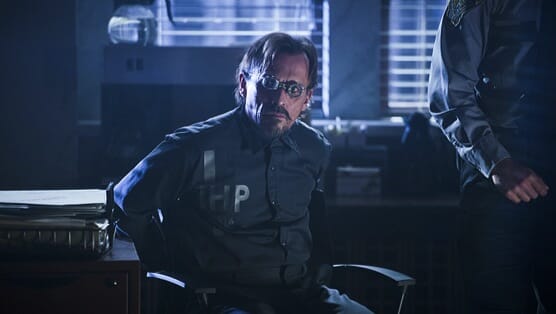
The largest knock against The Flash, of which there are few, has been its heavily formulaic nature. While it’s true that the show has stuck consistently to a villain-of-the-week format, its writers have subverted that scheme in ways that make the setup less redundant, and far more rewarding. Like it did with week five’s “Plastique,” last night’s “Power Outage” kept the bones of the format but shaped them in a way that presented the viewers something new.
The first, and biggest, change was the inclusion of a second antagonist, allowing for two distinct, though connected, storylines. On one side you had a standoff at the CCPD headquarters with the Clock King (Robert Knepper reprising, and excelling, in the role he first held on Arrow), and on the other, a standoff with Team Flash and this week’s metahuman, Farooq or Blackout. I am, more often than not, a proponent of simplified storytelling. There is no need for the writers to fracture their focus, and thus the audience’s, when one solidly written and plotted main storyline will do. However, given the right pacing and proper amount of focus, multiple prime storylines can be just as effective. Last night’s episode of The Flash could be used as Exhibit A in a courtroom proceeding debating the merits of the latter.
One big reason the multiple story scheme worked was the frenetic pacing. Once the episode got rolling, it pressed the pedal to the floor and didn’t hesitate for a second. Though easily the least action-packed hour of the season, it was the most tension-filled one, given the clever use of the bottle episode technique. Save for the opening third, “Power Outage” took place primarily in two cramped spaces. As it often does, the bottle technique helped keep anxiety and stress levels elevated, forcing the viewer to stay in the same visual field for an extended period of time. The setup also allowed the exceptionally astute mirroring of Barry’s internal struggle. When faced with Blackout’s electric powers, Barry learns that the villain has the ability to, essentially, drain or steal The Flash’s powers. Faced, for the first time since the particle accelerator turned him into the fastest man alive, with a life sans metahuman assets, Barry is understandably distraught. Throughout the entire episode he feels useless and trapped, much like the viewer feels, thanks to the claustrophobic locales. It’s another addition to the ever-growing list of intelligent choices this writing team has made in the first seven episodes, which, above all the wonderful things the show has going for it, may be the most to be excited about.
As is often the case, the most interesting storyline concerned S.T.A.R. Labs and Team Flash. The CCPD headquarters hostage situation wasn’t boring or uninteresting in the least, though, being propped up by the aforementioned Knepper as Clock King. Although he’s not a top-tier villain in the DC universe, Knepper’s portrayal of the time-obsessed criminal is so fun to watch that I can’t help but hope he finds a way to sneak out of prison and back into the worlds of either The Flash or Arrow. That said, while I enjoyed the two-storyline setup, there was a clear hierarchy at work. The CCPD standoff felt, at times, like an afterthought. It was as basic a hostage situation as there can be, and gave little for Jesse L. Martin, and just slightly more for Candice Patton, to do. It’s to be expected from a bottle episode. When placing the characters in cramped quarters, they will inevitably have less to do than they otherwise would. Similar effects were seen in the other plot, with Cisco and Caitlin being relegated to the merest of roles, but their diminished participation gave more time for Tom Cavanagh and his increasingly scheming Harrison Wells to, well, scheme.
I’ve written previously about my surprise over the quick pace at which the show is revealing Wells’ ulterior motives. I had imagined a slower rollout, but with each successive step that the character takes, showing how far he’ll go to ensure that future events happen as he wants them to, the more I can’t wait for Barry to realize just what he’s up to. It’s the showdown that seems inevitable for the finale, or perhaps even later, but I certainly wouldn’t complain if that timeline were to be sped up.
?Often, I feel like I’m missing something, having so little to say in terms of improvement for The Flash. Perhaps I have been struck with a case of rose-colored glasses, but the truth is that The Flash feels like a show in its third season, being so keenly aware of what it is and what it wants to do. It’s one of the most impressive new shows I’ve seen in years, and easily the most fun. Every step the writers take seem to work, thanks to their complete understanding of the core characters and the world they want to build around them. Next week brings a new challenge, though, as The Flash meets Arrow in the first, and highly-anticipated, crossover event for the two CW series. Given the two shows’ vastly different tones, there is certainly trepidation heading into the two-night event, but even if it falls below the high bar that The Flash has set for itself thus far, I’ll be just as ready for the next Tuesday to roll around.
Eric Walters is a Detroit-based freelance writer and regular contributor to Paste. For more of his TV musings, follow him on Twitter.